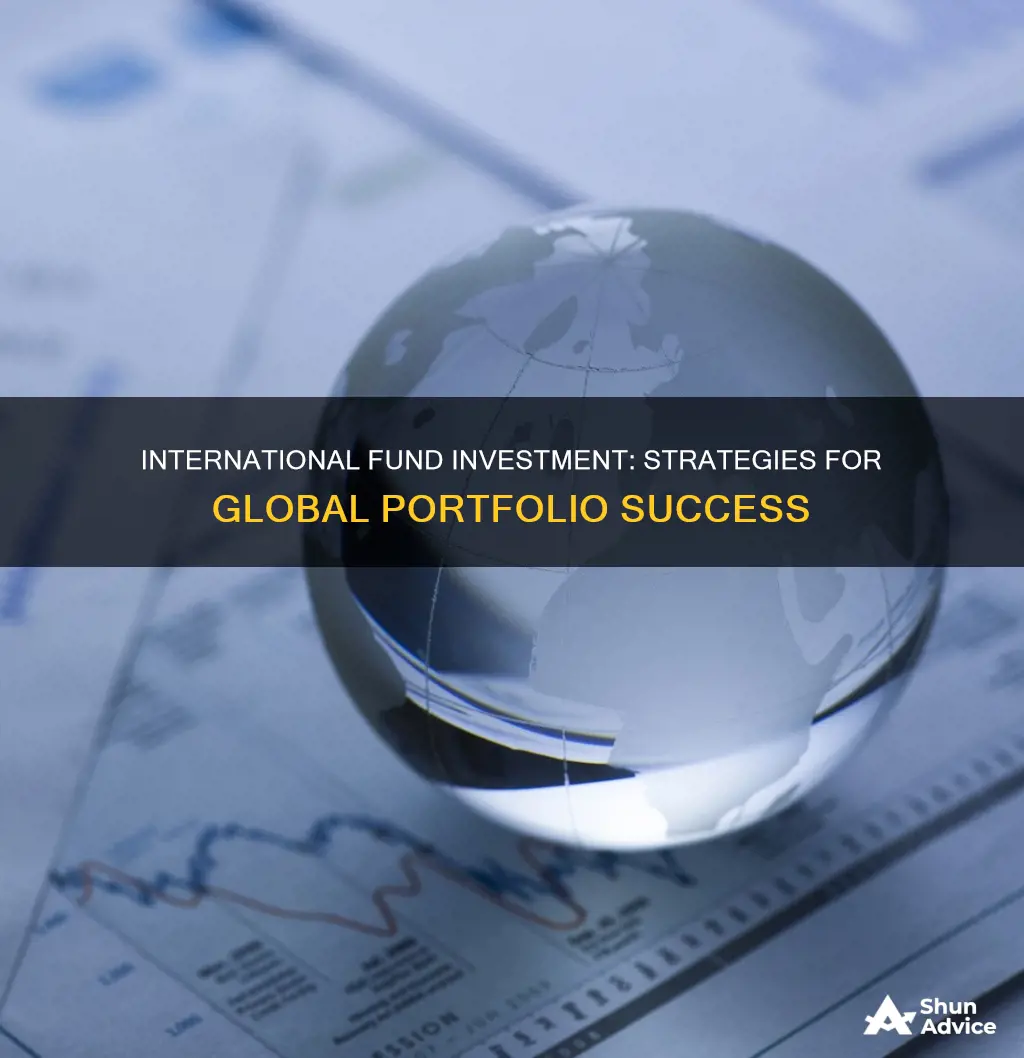
International mutual funds are a great way to diversify your portfolio and gain exposure to global markets. These funds invest in stocks, bonds, or a mix of both, across multiple countries or regions outside of an investor's home country. They provide access to companies and industries that may not be available in domestic markets, allowing investors to capitalise on growth opportunities worldwide.
There are several types of international funds, including global funds, regional funds, country funds, and global sector funds. These funds can be an effective way to hedge against the depreciation of local currencies and supplement domestic exposure to foreign economies.
When choosing international funds, it is important to consider factors such as financial goals, risk tolerance, fund performance, expenses, and the fund management team's track record. It is also crucial to understand the tax implications of investing in international mutual funds, as they may differ from those of domestic investments.
Overall, investing in international mutual funds offers Indian investors a chance to broaden their investment horizons and tap into the growth prospects of companies and markets abroad.
| Characteristics | Values |
|---|---|
| Type of Fund | International Mutual Fund |
| Investment Type | Equity or Equity-Related Instruments |
| Investment Location | Outside of India |
| Investor Profile | Long-term Investors, High-Risk Appetite, Well-Diversified Portfolio |
| Investment Options | Direct Stock Purchase, Global Funds, Regional Funds, Country Funds, Global Sector Funds |
| Taxation | LTCG taxed at 12.5% after 24 months, STCG taxed according to income tax slab |
| Advantages | Diversification, Growth Potential, Hedging Against Inflation, Exposure to Global Leaders |
| Disadvantages | Currency Risk, Country Risk, Liquidity Risk, Company-Specific Risk |
What You'll Learn

Know your investor personality
Before investing in international mutual funds, it is important to understand your investor personality, including your financial goals, risk tolerance, and investment style. Here are some key considerations to help you know your investor personality:
- Financial Goals: Start by defining your financial objectives for investing in international mutual funds. Are you seeking long-term growth, income generation, or a combination of both? Be clear about what you want to achieve with your investments.
- Risk Tolerance: Assess your risk tolerance, which is your ability to handle potential losses and market volatility. Consider how comfortable you are with taking risks and the potential impact on your financial goals.
- Investment Horizon: Determine your investment horizon, which is the length of time you plan to stay invested in international mutual funds. Longer investment horizons typically allow for greater potential for growth and can help smooth out short-term market fluctuations.
- Diversification Needs: Evaluate your current investment portfolio and identify areas where you may be overexposed or under-exposed. International mutual funds can help diversify your portfolio by providing access to global markets and reducing the impact of local market fluctuations.
- Return Expectations: Understand your expected returns from international mutual funds and how they fit into your overall investment strategy. Be realistic about the potential returns and consider the historical performance of similar funds.
- Liquidity Needs: Consider your liquidity needs, which refer to how easily you can access your invested funds. International mutual funds may have different liquidity features, such as lock-in periods or redemption fees, which can impact your ability to withdraw your investment.
Once you have a clear understanding of your investor personality, you can use this information to choose international mutual funds that align with your goals, risk tolerance, and investment style. Remember to always consult with a financial advisor to ensure that your investment decisions are suitable for your specific circumstances.
Smart Ways to Invest in Vanguard Star Fund with $2000
You may want to see also

Explore mutual funds
Mutual funds are a great way to invest in international funds and offer a range of benefits to investors. They provide an opportunity to diversify your portfolio and reduce risk by investing in a variety of markets, sectors, and industries. Mutual funds also offer global exposure, allowing you to invest in foreign companies and take advantage of international growth.
When investing in international mutual funds, it is important to consider the different types available. These include global funds, which invest in companies all over the world, including the investor's home country. On the other hand, international funds or foreign funds invest only in companies outside of the investor's home country. There are also regional funds, which focus on a specific geographic region, and country funds, which invest only in companies from a single foreign country.
It is also important to understand the risks associated with international mutual funds. These funds can be more volatile due to fluctuations in currency exchange rates and the impact of political, social, and economic aspects in different countries. Additionally, the tax treatment of international mutual funds should be considered, as gains may be subject to different tax rates depending on the holding period.
When choosing an international mutual fund, investors should carefully research the fund's investment objectives, risks, and performance. It is also important to consider the fund's portfolio and ensure it aligns with your financial goals. For example, some funds may invest only in stocks from developing markets, while others may have a mix of domestic and foreign equities. Seeking advice from a financial planner or advisor can also help you make an informed decision.
Some popular international mutual funds in India include the Franklin India Feeder Franklin US Opportunities Fund, ICICI Prudential US BlueChip Equity Fund, and PGIM India Global Equity Opportunities Fund. These funds offer exposure to the US market and have performed well in recent years.
In conclusion, international mutual funds offer a great opportunity to diversify your portfolio and gain exposure to foreign markets. By carefully considering the different types of funds, their risks, and your own financial goals, you can make a well-informed investment decision. Remember to seek professional advice and understand the tax implications before investing.
Bridgewater Associates: Investing in the Premier Hedge Fund
You may want to see also

Understand the types of international funds
International funds are a great way to diversify your portfolio and reduce risk, as markets around the world rarely go down together. They also allow investors to tap into the growth of foreign markets and invest in global giants like Facebook, Google, and Netflix, which are not listed on Indian stock exchanges.
Global Funds
Global funds invest in securities worldwide, including the investor's home country. For example, an investor in India could invest in a global fund that includes Indian companies, as well as companies from other countries around the world. This provides broad exposure to a wide range of markets and economies.
International Funds
International funds, on the other hand, invest in securities globally, excluding the investor's home country. So, an investor in India would only have exposure to companies and markets outside of India. This allows investors to access foreign markets and reduce their dependence on the performance of their domestic market.
Regional Funds
Regional funds focus on companies within a specific geographical region, such as Europe or Asia. This type of fund can be a good choice for investors who want to target a particular region that they believe has strong growth potential or that complements their existing portfolio.
Country Funds
Country funds invest exclusively in securities from a single foreign country. For example, a country fund might focus solely on the U.S. market or the Japanese market. This type of fund can provide investors with a high level of exposure to a specific country's economy and its performance. However, investing in country funds requires extensive research, as the returns will be closely tied to the performance of that particular country.
Global Sector Funds
Global sector funds target companies within a particular sector but across various countries worldwide. For instance, a global sector fund might focus on the technology sector, investing in tech companies from multiple countries. These funds are a good choice for investors who want to benefit from the growth of a specific sector, regardless of the geographic location of the companies.
Roku's Investment Funds: Who's Backing the Streaming Giant?
You may want to see also

Assess the risks
International mutual funds can be a great way to diversify your portfolio and gain exposure to global markets. However, as with any investment, there are risks involved that you should carefully assess before investing. Here are some key risks to consider when investing in international funds:
Foreign Market Risk
International funds expose investors to the economic, political, and market risks of foreign economies. These risks may be higher in emerging markets due to factors like lack of liquidity and regulatory frameworks. Political and economic instability in a country can lead to significant losses for investors. For example, if a country experiences a financial crisis or civil unrest, the value of stocks in that country could plummet.
Exchange Rate Risk
Foreign exchange rates fluctuate, and these fluctuations can impact your investment returns. When you invest in a foreign market, you buy foreign currency, and when you sell your investment, you convert it back to your domestic currency. If the foreign currency has weakened against your domestic currency during the holding period, the value of your investment will decrease. Currency volatility adds an extra layer of complexity and risk to international investing.
Concentration Risk
International funds with concentrated investment portfolios may be vulnerable to sector-specific downturns, increasing the risk of losses. A well-diversified portfolio that invests across different countries and sectors can help mitigate this risk.
Higher Transaction Costs
Brokerage commissions and other fees tend to be higher for international investments. When investing in foreign markets, you may encounter additional charges such as stamp duties, levies, taxes, clearing fees, and exchange fees. These higher transaction costs can eat into your investment returns.
Liquidity Risk
Some international markets, especially emerging markets, may have lower liquidity than domestic markets. This means it can be more difficult to buy or sell securities, leading to wider bid-ask spreads and higher transaction costs. There may also be restrictions on the amount or type of stocks that foreign investors can purchase.
Information Access
Accessing information about foreign companies can be challenging. Many companies outside your home country may not provide the same level of disclosure as domestic companies, and the information may not be available in your language. This makes it difficult to conduct thorough research and make informed investment decisions.
Legal and Regulatory Differences
Foreign markets may have different regulations and investor protections than what you are accustomed to in your home country. Working with a foreign broker or investment advisor who is not registered with your country's regulatory authorities can be risky. Understanding the legal remedies available to you as a foreign investor is essential, as you may face challenges when seeking recourse in foreign courts.
Country-Specific Risks
Each country has its own unique set of risks, including economic, political, and social factors that can impact your investment. For example, natural disasters, policy changes, and other country-specific events can affect the performance of your international investments.
Tax Implications
International investments may be subject to different tax rules and regulations than domestic investments. Consult with a tax advisor to understand the tax implications of investing in international funds, including any withholding taxes, capital gains taxes, or other tax liabilities.
Impact of Currency Fluctuations
The performance of your international investments will also be influenced by currency fluctuations. If the local currency of the country you are investing in weakens against your domestic currency, it will reduce the value of your investment when converted back.
Investing in HDFC Balanced Advantage Fund: A Comprehensive Guide
You may want to see also

Consult a financial advisor
Investing in international mutual funds can be a complex process, and it is always advisable to consult a financial advisor to help you navigate the potential risks and benefits. Here are some reasons why consulting a financial advisor is a good idea when considering international funds:
- Expert Guidance: Financial advisors are professionals who have extensive knowledge and experience in the field of investments. They can provide valuable insights into the global markets and help you make informed decisions. They can also guide you through the investment process, ensuring you take the necessary steps and consider all relevant factors.
- Risk Assessment: One of the most critical aspects of investing in international funds is understanding and managing risk. A financial advisor can help you assess your risk tolerance and determine the level of risk you are comfortable with. They can also help you identify and mitigate potential risks associated with international investing, such as currency fluctuations, political instability, or economic downturns in specific countries.
- Portfolio Diversification: Diversification is a key strategy in investing, and a financial advisor can help you structure a well-diversified portfolio that includes international funds. They can assess your current portfolio and make recommendations to ensure you have a balanced mix of domestic and international investments across different regions, sectors, and asset classes.
- Tax Implications: Investing in international mutual funds may have different tax implications compared to domestic investments. A financial advisor can help you understand the tax regulations and implications of investing in international funds. They can guide you through the tax rules and ensure you are compliant with the tax laws in your country and the countries where you are investing.
- Fund Selection: There are numerous international mutual funds available, and selecting the right ones can be daunting. Financial advisors have the expertise and resources to research and analyze different funds. They can help you identify funds that align with your investment goals, risk tolerance, and time horizon. They can also provide insights into the track record, performance, and management of specific funds.
- Long-Term Planning: International funds are typically suited for long-term investment horizons. A financial advisor can help you incorporate international funds into your overall long-term financial plan. They can assist in setting realistic expectations, ensuring you have a clear understanding of the potential returns and risks over the long term.
- Monitoring and Rebalancing: Once you have invested in international funds, it is essential to monitor their performance regularly. Financial advisors can help you track your investments and make necessary adjustments to your portfolio. They can advise you on when to buy or sell specific funds, ensuring your portfolio remains aligned with your investment goals and risk tolerance.
Warren Buffett's Stance on Index Funds Explained
You may want to see also







